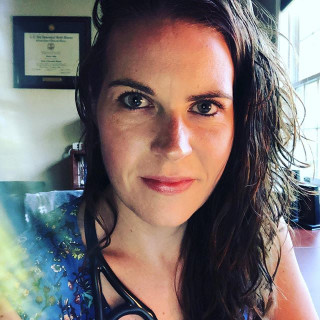By the middle of my fourth year of medical school, I was convinced that I would finally feel like I “made it” once I was actually able to call myself “Dr. Yates.” I just knew that when I was in residency I would feel like I was “smart enough” to be a doctor.
The problem with impostor syndrome is that it often goes unrecognized. We think that the thoughts we have about being “enough” are facts. Also, people who have a desire to become physicians tend to have many characteristics of people who are at the greatest risk of developing impostor syndrome. These include being a perfectionist, having a fixed mindset, having a fear of failure, and feeling different from your peers. The more successful you are, the more likely you are to have impostor syndrome, especially if you are a woman. These characteristics become more pronounced as you progress in your medical training. You have been exceeding for your whole life, and with that comes comparison to others. You become acutely aware of this comparison as you apply for medical school, and you feel like you are just the sum of your MCAT scores and college grades instead of a whole person.
Then you get into residency. The pace is fast, the list of things you need to learn is endless, and you are constantly compared to your co-residents in a variety of ways, from intelligence, to technical abilities, to professionalism.
As an ob/gyn, we spend most of our first year of residency on the labor floor. My first day was a whirlwind of surgeries, scrubbing, admitting people, delivering babies, and trying not to be intimidated by the nurses on Labor and Delivery. It was exhausting. On my way home from work, I called my mom and told her that I was sure I would never be able to handle this “doctor thing.”
“I am in way over my head! They expect me to do and know things that are definitely impossible for me,” I said to her, crumpling into my seat. So much for feeling “good enough.”
I had just finished doing my first C-section that I got to scrub in on the “surgeon’s side” as an intern. It was stressful, and I felt like a total fraud as I was fumbling with the instruments and having to think so carefully about every step before doing it. I remember sitting down to dictate, pulling out my script to remind myself what to say, and thinking that there was no way that I would ever be able to confidently do a C-section alone and then dictate the steps from memory. Impostor syndrome clouded my ability to believe that I would ever be able to improve upon my skills and eventually become an expert.
I had scenarios like this every day in residency. Little did I know, I was setting myself up for an emotional disaster as an attending. I did not know how to take an inventory of my thoughts and then question them. No one was teaching that in medical school or residency.
Like so many other physicians, I was expecting to feel like I finally “made it” once I graduated from residency (especially since that didn’t happen after medical school). I thought for sure that I would be completely fulfilled once I was an attending physician.
That never happened. What I know now is that we must deal with impostor syndrome head on if we want to overcome it. Dealing with it head on means recognizing it for what it is: a normal part of being a human being, especially if you are a "high achiever." Unfortunately, it does not resolve on its own with time and experience. Our brains will think of new excuses about why we don’t belong. That is, of course, unless we teach ourselves how to recognize the thoughts that cause impostor syndrome and provide new thoughts instead. Admittedly, this is not an overnight remedy, but I can assure you that over time, this can drastically alter your view of the world and the thoughts that you have about yourself and your abilities.
I think back to when I sat there with my book of dictations in hand, feeling convinced that I would never be able to dictate an entire C-section, let alone perform one. Looking back now, as an ob/gyn attending who performs C-sections regularly, with no doubt in my abilities, it's a good reminder that we never stop learning and growing. We have to remember to not underestimate our ability to constantly learn and apply new skills. We are not impostors, just growing.
Kristin Yates is a board certified ob/gyn practicing in New Hampshire and a life coach for women physicians who are being held back by self-doubt. She has no conflicts of interest.
This excerpt is featured in part or full in The Chronicles of Women In White Coats 3.
Illustration by Jennifer Bogartz







